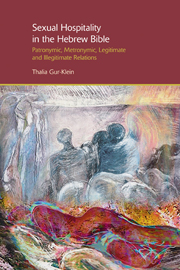 Sexual Hospitality in the Hebrew Bible
Sexual Hospitality in the Hebrew Bible Book contents
- Frontmatter
- Contents
- Acknowledgements
- Introduction
- 1 Patriarch hospitality and sexual hospitality
- 2 Marital and non-marital systems
- 3 Baal marriage of dominion
- 4 Metronymic marriage: remaining with kin – counter-patterns of baal marriage
- 5 Intersecting patterns and conflicting imperatives
- 6 Widow marriage, land and kin surrogacy
- Epilogue: moral imagination
- Notes
- Bibliography
- Index
4 - Metronymic marriage: remaining with kin – counter-patterns of baal marriage
- Frontmatter
- Contents
- Acknowledgements
- Introduction
- 1 Patriarch hospitality and sexual hospitality
- 2 Marital and non-marital systems
- 3 Baal marriage of dominion
- 4 Metronymic marriage: remaining with kin – counter-patterns of baal marriage
- 5 Intersecting patterns and conflicting imperatives
- 6 Widow marriage, land and kin surrogacy
- Epilogue: moral imagination
- Notes
- Bibliography
- Index
Summary
So far we have discussed conjugal patterns associated with baal marriage of dominion. Such conjugal forms transfer a woman from her natal kin to her husband's abode, which falls under exogamous marriage. The husband pays an appropriate purchase price for a chief-wife, a concubine or a slave-wife respectively; such marriage is affiliated with bonds of dominion that inaugurate the woman to a husband's household, kin and tribe; divorce is a husband's prerogative only; and generally baal marriage regards offspring as belonging to the husband's family line. While a woman relinquishes her asset rights to her natal family land on her exogamous marriage as she leaves her natal family, he has no direct asset rights to her husband's land; she may enjoy it through her offspring – counted as her husband's heirs, they are her eventual providers in her widowhood.
However, alternative forms of marriage counter balance baal marriage of dominion. Such conjugal bonds comprise rules and laws that divert from those of baal marriage by allowing or obliging the woman to remain residing with her kin after her marriage. Two kinds of marriage enable a woman to remain with her kin. One type sees the woman marry one of her kin, with the eventual consequence that both partners remain on their tribal land with their mutual kin and their offspring are considered to be of joint descent. Such a marriage is entitled endogamy (Robertson Smith [1885] 1907: 74, 101).
- Type
- Chapter
- Information
- Sexual Hospitality in the Hebrew BiblePatronymic, Metronymic, Legitimate and Illegitimate Relations, pp. 159 - 204Publisher: Acumen PublishingPrint publication year: 2013


